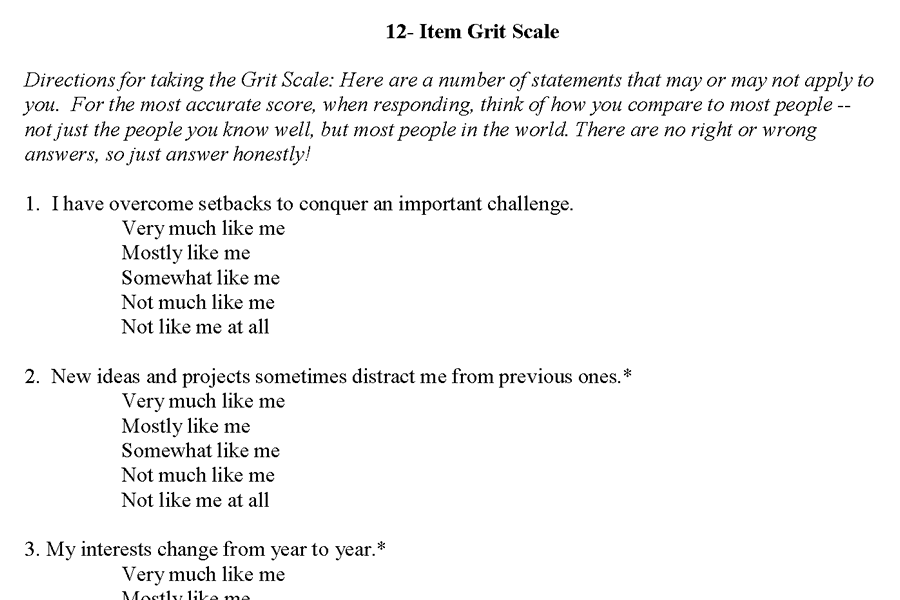
Getting the proper amount and right type of exercise, minimizing sitting time, and eating a balanced, nutritious diet are key to maintaining physical fitness and a healthy lifestyle. Some people demonstrate unwavering resolve in sticking to these goals while others simply lack the motivation to do so. So why do some people possess the drive and discipline required to engage in healthy behaviors while others do not? The answer may lie in the personality traits of grit.
Grit plays a significant role in a person’s ability to adhere to healthy lifestyle behaviors
Existing literature suggests that personality plays a significant role in explaining why some individuals are more conscientious than others when it comes to making positive lifestyle choices that include vigorous exercise, minimizing sedentary activities, and eating a healthy, balanced diet. According to researchers, engaging in these behaviors on a consistent basis and overcoming the setbacks, plateaus, and challenges often encountered in doing so requires the personality traits of grit. Researchers define grit as consistency of interest and sustained persistence toward achieving long-term goals. Grit is characterized by a person’s resilience, ambition, conscientiousness, endurance, and self-control.
Levels of grit may vary across population subgroups
While research demonstrates a positive correlation between grit and healthy lifestyle behaviors for adults as a group, studies have shown subtle variations in grit among specific population subgroups. One such study was conducted by researchers from George Mason University’s School of Kinesiology in which they examined the relationship between grit and physical activity, sitting time, and dietary behaviors in several population subgroups including U.S. adults, active-duty members of the military, civilian personnel, veterans, college students, and performing artists.
Working in collaboration with investigators from Clarkson University, the American Public University System, and Mason’s Hylton Performing Arts Center, Mason researchers helped administer an internet-based survey of study participants between the spring and summer of 2020. The survey included the Grit Scale Short Form (Grit-S) which consists of questions designed to measure the personality traits of perseverance and passion for long-term goals and contains representative statements such as “Setbacks (delays and obstacles) do not discourage me” and “I am a hard worker.” Participants chose from responses ranked on a scale of 1 (not at all like me) to 5 (very much like me). Individuals were also asked to report the frequency, duration, and intensity of exercise sessions and amount of sitting time they engaged in during a 7-day period, along with the frequency and types of food choices made during that same time.
Researchers found that occupational requirements could affect the influence of grit
In general, the survey results demonstrated the importance of grit in engaging in moderate to vigorous physical activity, minimizing sitting time, and practicing good eating habits. Still, there were some interesting nuances in the results. Among these, the responses showed a strong correlation between physical activity and grit for the US adult, civilian, and college student populations. Researchers point out that these populations are not subject to any occupational mandates or standards requiring that they engage in physical activity. In contrast, groups such as active-duty military personnel have jobs that require them to be physically active and to meet certain fitness standards. Other populations such as performing artists may engage in elevated levels of physical activity to maintain peak performance, like professional dancers. These study findings highlight the importance of grit for those individuals who are not required to be physically active and support existing research that suggests a positive relationship between grit and physical activity in populations not required to engage in physical activity for occupational reasons.
The Short Grit Scale can play a key role in developing health and wellness plans
Engaging in healthy lifestyle behaviors, such as getting recommended amounts of moderate to vigorous exercise, can be challenging and many Americans fall short in achieving this goal. According to a CDC data brief published in August 2022, only about one-quarter of US adults aged 18 and over met the physical activity guidelines for both aerobic and muscle-strengthening activities in 2020. While researchers acknowledged that the timing of the study taking place at the onset of the COVID-19 pandemic may have skewed their results due to the significant lifestyle changes brought on by the virus, there remained compelling evidence that the personality traits of grit had a positive impact on increasing physical activity, reducing sitting time, and encouraging healthy dietary habits. Therefore, some researchers recommend that the Short Grit Scale should be utilized to ascertain an individual’s baseline grit status from which a customized health and wellness plan could be developed.
To learn more about grit and how it influences healthy lifestyle behaviors, read this article by Mason faculty and researchers. Mason’s School of Kinesiology offers degree programs that focus on the scientific study of human movement and its application in settings such as athletics, dance studios, and clinical practices. Please visit our website to learn more.
